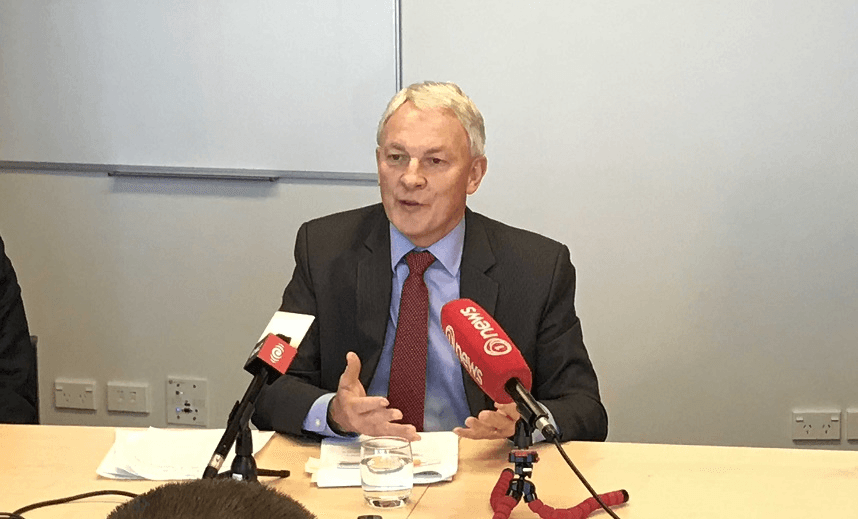Is it 1.4%, 2.5%, 6.2%, 9% or something else? Simon Wilson explains how much Auckland rates are really going to rise under the mayor’s new proposal – and wonders why some of the reporting has been so confusing.
This afternoon Auckland Council debates the draft 10-year budget proposed by mayor Phil Goff. They may have been surprised at the way some of the numbers have been reported.
Here are the facts. The average Auckland property is now worth $1,080,000 and in the 2017/18 year will pay rates of $2354. Under the mayor’s proposal, the rates on that property will rise in 2018/19 to $2386. The increase in residential rates is 1.4%.
But wait. There will be a rise of 2.5% in the general rate, plus a new “water quality” targeted rate of 2.8% and a new “natural environment levy” of 0.9%. That’s a combined increase of 6.2% – obviously much more than 1.4%. What’s going on?
The answer is that the Interim Transport Levy of $114 per year, which we have all been paying whether or not we drive, will come off. That levy is 4.8% of the current average rates bill. So, 6.2% minus 4.8% equals 1.4%.
That’s the net figure: it includes all the additions and subtractions proposed for your rates bill.
But, then we have to allow for the proposed regional fuel tax, which Goff wants and the government has said will happen. It’s expected to be 10c/litre before GST, which means 11.5 cents including GST.
It will be charged at the petrol pump, not on your rates bill, so it’s not included in the calculations for the rates increases. But it will be income to the council and it will be paid by most people, because most people drive. How much will it work out at? That depends how much you use your car.
If you don’t drive you won’t pay a cent. If you’re an average driver, according to the AA, you’ll pay around $125 extra a year. Mark Stockdale, the AA’s principal adviser (regulations), who calculated that figure, says it’s based on a regional fuel tax of 10c/litre, and a medium-sized car with a 2.0-3.5L engine, driving 14,000km in a year. (He stresses that there are many assumptions in that calculation: it’s a ballpark indicator, not a precise amount.) That $125 annual figure, by the way, becomes about $2.40 a week, assuming you drive about the same amount each week.
And, in case you were wondering, $125 equates to a 5.3% increase in the 2017/18 average rates of $2354.
Remember, though, raising the price of petrol is not just a revenue generator for public transport projects. It is also intended as a market-led price signal to people to use their cars less. In many parts of the city, public transport, cycling and walking options have improved rapidly in recent years, making it easier – not for all but for many – to leave the car at home. In theory, the average fuel tax for Aucklanders will come down from that $125 per year.
The Herald has reported most of the numbers accurately, but has wrongly said $125 “equates to a rates rise of about 9%”. Mark Stockdale says he doesn’t know where that 9% figure came from, but it wasn’t the AA.
Over on the RNZ website, the headline declares: “Auckland ratepayers could face 6.2% hike”. And that is how RNZ has been introducing the item in its news bulletins. Only in the later detail did it explain that the loss of the Interim Transport Levy would mean the rates rise is really only 1.4%.
There’s an argument that the transport levy was going to end anyway, so the benefit of that shouldn’t be factored into the equation. In fact, there is no rule that says it has to end: council could keep the levy if it wanted, and the idea has been seriously debated among councillors and staff – although not formally. They do have a choice. Goff is proposing not to keep the levy, so it does seem appropriate to factor it in.
To recap: assuming the relevant proposals are adopted, your rates bill will go up by 1.4%, and if you’re an average driver in a average car you will pay about $125 more a year for petrol.
Council will debate the mayor’s 10-year budget proposal this afternoon, aiming to adopt it as a draft proposal next month and put it out for public consultation in late February and March. There’ll be much to say. You can read the 25-page summary of that budget here.
simon@thespinoff.co.nz @simonbwilson
